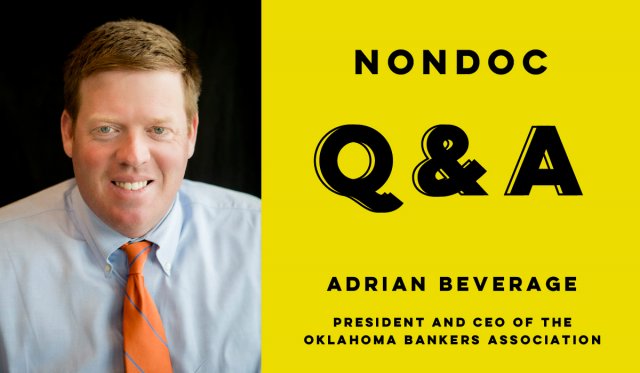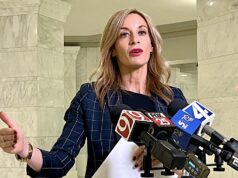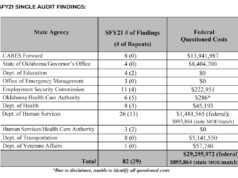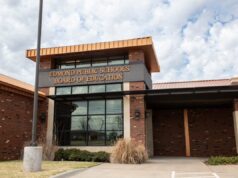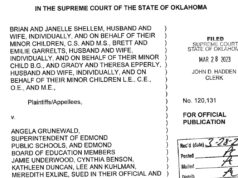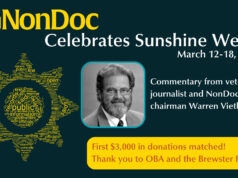
Adrian Beverage has practically grown up in Oklahoma’s banking industry. His father, Roger Beverage, shepherded the Oklahoma Bankers Association as president and CEO for more than three decades.
The Oklahoma Bankers Association assists its members with government relations, educational programs, legal and compliance services, communications, insurance products and numerous other products and services.
The elder Beverage recently stepped down from that post and into full-time retirement last month. The OBA’s board recently appointed Adrian, who has also worked at the OBA for two decades, as his father’s successor.
In this Q&A, Adrian Beverage talks about banking in Oklahoma, parenting and his love of the University of Nebraska football program, which has fallen on hard times. Answers have been edited lightly for style and clarity.
What do you find most interesting about banking in Oklahoma?
During the Paycheck Protection Program, especially early on, many of our banks were having difficulty gaining access to the Small Business Administration portal. It was at no fault of their own, as the portal wasn’t able to handle the initial volume of banks nationwide. I’ve always known our banks are competitive, but what I saw during all this was really impressive.
There were numerous examples, both in rural and urban markets, where one bank had access to the portal and another didn’t. I heard so many stories where one bank would reach out to the other to help take care of their respective customer. Normally, it would be a great opportunity for one bank to court a new customer, but it didn’t happen. Both banks knew the importance of the program, and at the end of the day, making sure a customer’s business was able to receive its funds was more important that beating your competitor.
What is it like following such a well-known figure in the banking industry like Roger Beverage — who also
happens to be your dad — as president and CEO of the OBA?
Having the opportunity for 20-plus years to see how he works, especially at the national level, he was known as the guy who could bring all parties together to get things done. What I will appreciate the most is simply having the opportunity to work with my dad for all those years. We’ve had our moments where we didn’t see eye-to-eye on one issue or another, and he would let me know in the way only a father can tell their son he is wrong and the conversation is over. But you could count on one hand the times we had those type of talks.
What trends do you see in banking, both in Oklahoma and nationally?
I believe we will see more mergers and acquisitions in the future, not only in Oklahoma but nationwide. I also think because of COVID, banks had to become even more dependent on technology than they were before the pandemic. These technological advances in banking will only benefit the customer experience.
What’s the most rewarding part of your job?
The most rewarding part of the job is when you accomplish a task that benefits a bank, whether it’s a piece of legislation, a rule or new regulatory action. Knowing these changes are going to not only benefit the bank, but also the customer, is very rewarding. I also find it gratifying to see a young banker get involved in the association and watch them grow and become an incredible banker.
How has the COVID-19 pandemic affected banking in Oklahoma?
COVID-19 had a significant impact on banking, just like it did on every business. We were deemed an essential business by the government early on, and it created quite a few challenges for our banks. Every bank in the state had to come up with a strategy on how they were going to continue providing services while also protecting their employees and customers. While all this was happening, they were also tasked to be the lifeline to one of the country’s largest and most complex programs ever: the Paycheck Protection Program.
The best way to sum up the PPP is its the equivalent of building an airplane while it’s flying. The rules and responsibilities of the program changed daily, if not hourly, and our bankers fought through the bureaucracy of Washington to make sure the funds got to their customers. Customers know at the end of the day that without the banks, their businesses would have been in a really bad place. The pandemic not only provided an opportunity to help those in need, but it was also a chance to strengthen those relationships.
What’s the part of your job that you find most challenging?
The most challenging part of the job, by far, is working with elected officials and federal agencies. With that being said, members of the Oklahoma Legislature and our federal delegation are actually great to work with. They are all business-friendly and understand the role community banks play in Oklahoma.
The folks in Washington who aren’t from Oklahoma, or who work for a federal agency that doesn’t know what community banks across the country actually do for their customers — especially small businesses — are a bit trickier to handle. Rules and regulations that come out of Washington sometimes only make life harder for bank customers and business owners. It’s a constant battle to make sure all those who make the rules understand what the consequences are and who is really going to be negatively impacted by their decisions.
Is there any legislation that’s out there on the state and national level that might have an impact on banking?
H.R. 1996 (the SAFE Banking Act of 2021) is very important, not only to our industry, but to the state. The bill would allow banks to provide services to the marijuana industry without fear of penalties from federal regulators.
It would not only allow banks to work with all these businesses, but it would also permit this in the medical marijuana industry, which would help to build relationships with their local bankers to make their business run smoother and be more profitable. H.R. 1996 passed the U.S. House of Representatives on April 19, so it’s now in the U.S. Senate waiting to be heard.
What do you do outside work as far as hobbies and interests?
I’m happy to say I have no personal hobbies, and my interests are only in my three kids and their never-ending activities. My wife and I are constantly on the go, and we wouldn’t have it any other way. Molly (13) is on the junior high pom team and is also a competitive dancer. Her practice schedule for dance usually gets her home after 9 p.m. every night, and then she’s on the road at competitions a lot of weekends.
Grady (10) has a never-ending love for baseball. He’s currently on two teams, one that only plays on the weekends and regularly travels around to tournaments, and another team with his school friends that plays during the week in a league. A normal week for him is five to seven games and four nights of practice. As long as he loves the game and wants to keep this ridiculous schedule up, we’ll be there for him.
Grant (4) has found a love for baseball. He’s currently in his first year of tee ball and can’t get enough of it.
Who and what inspires and motivates you?
Professionally, I’m inspired by the members of our association, as we hear stories all the time about how they helped a family get their first home or worked with them to make sure their kids can go to college. Stories like this make it easy to get up in the morning and come to work. My family motivates me personally, as I want to provide them with every opportunity possible to make their life better, and most importantly, raise them as good kids and make sure they have the life skills they need to be successful.
Will Nebraska football ever be relevant again?
When Nebraska left for the Big 10 in 2011, the foundation of its master plan was two-fold: put everything into academics, and let Ohio State win everything for 10 years because the Buckeyes are really insecure and are hard to be around if they aren’t winning.
This will be Coach Scott Frost’s fourth year at Nebraska, and he’s finally cleaned house from the previous administrations and is ready to re-establish the dominance of the Big Red! While we take the country by storm this year, we won’t lose our focus on academics. Remember: The “N” on the side of the helmet stands for knowledge, and that’s something we’ll continue to strive for.








